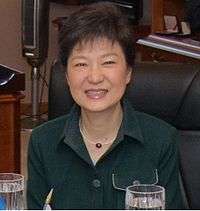Bon-gwan
| Bon-gwan | |
| Hangul | 본관 |
|---|---|
| Hanja | 本貫 |
| Revised Romanization | Bon(-)gwan |
| McCune–Reischauer | Pon'gwan |

Bon-gwan is the concept of clan in Korea, which is used to distinguish clans that happen to share a same family name (clan name). Since Korea has been traditionally a Buddhist country, this clan system is cognate with Gotra in Sanskrit texts and shares most features.
A Korean clan is a group of people that share the same paternal ancestor and is indicated by the combination of a bon-gwan and a family name (clan name). Subsequently, a bon-gwan is treated as though a part of a Korean person's name. The bon-gwan and the family name are passed on from a father to his children, thus ensuring that persons in the same paternal lineage share the same combination of the bon-gwan and the family name. A bon-gwan does not change by marriage or adoption.
Bon-gwan are used to distinguish different lineages that bear the same family name. For example, the Gyeongju Kim and the Gimhae Kim are considered different clans, even though they happen to share the same family name Kim. In this case, Gyeongju and Gimhae are the respective bon-gwan of these clans.
Different family names sharing the same bon-gwan sometimes trace their origin to a common paternal ancestor, e.g. the Gimhae Kim clan and the Gimhae Heo clan share Suro of Geumgwan Gaya as their common paternal ancestor, though such case is exceptional.
According to the population and housing census of 2000 conducted by the South Korean government, there are a total of 286 surnames and 4,179 clans.[2]
Restriction on marriage and adoption
Traditionally, a man and a woman in the same clan could not marry, so the combination of the bon-gwan and the family name of a husband had to differ from that of a wife. Until 1997, this was also the law, but this was ruled unconstitutional - and now DNA tests have superseded bon-gwan as an indication of one's lineage.
When adopting a child, the adoptive father and the adoptive child must share the same combination of the bon-gwan and the family name.[3] However, exceptionally, adoptive parents can change adopted child’s family name for the adopted child's welfare.[3] In this case, the adoptive parents must visit family court to request permission to change the family name.[3]
Full list of extant Bon-gwan
It is possible for Korean nationals and Korean descendants to look up their own bon-gwan. List of living and newly created bon-gwan can be viewed in the following links:
- Category:Korean clans
See also
References
- ↑ 정복규의 한국 성씨를 찾아서 -박근혜 후보와 고령박씨 (in Korean). Shina Ilbo. 2012-12-11. Retrieved 2013-10-21.
- ↑ "2000 인구주택총조사 성씨 및 본관 집계결과". 통계청 (in Korean). Statistics Korea. Retrieved 20 October 2017.
- 1 2 3 Law Agency. "The law of Family name and Bon-gwan(adoptive child)". easylaw.go.kr (in Korean). Retrieved 2018-04-14.
External links
List of Korean clans (in Korean)